Batch Planning: Using Frameworks to Take Back Your Life Outside the Classroom! with EBAcademics
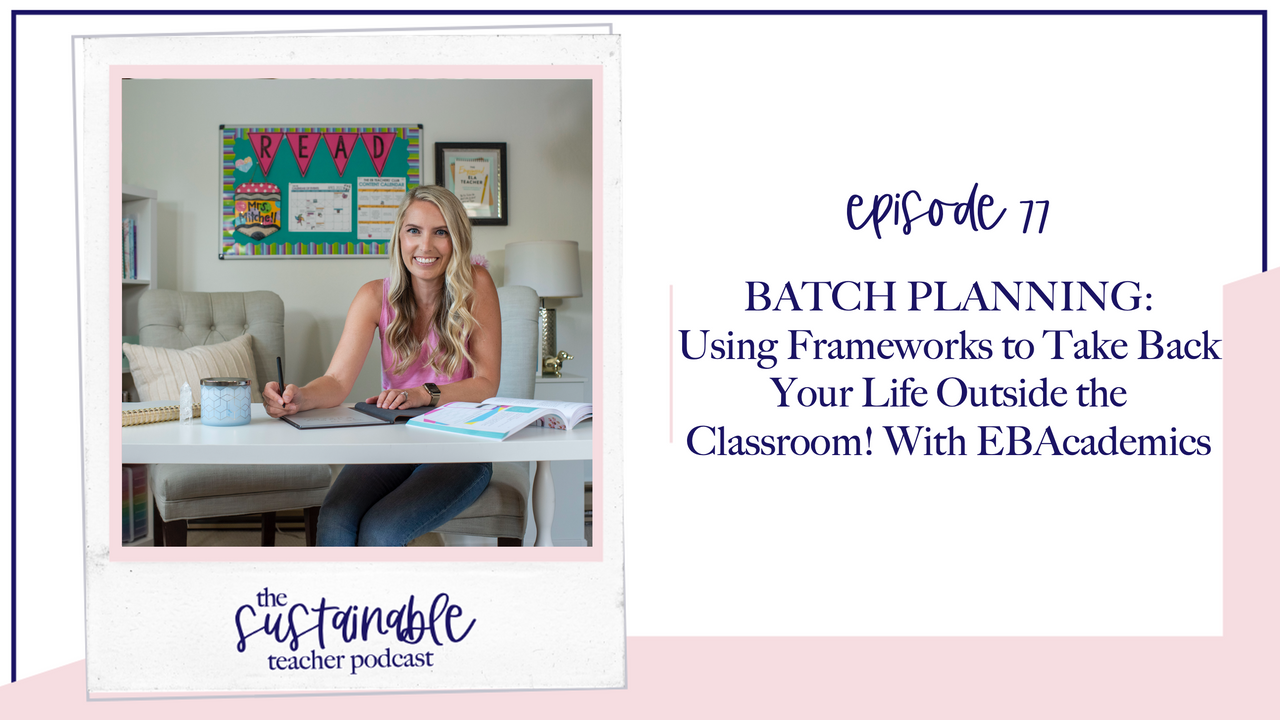
Welcome back to the Sustainable Teacher Podcast, I am so excited to be welcoming a special guest on this episode, and it is Caitlin Mitchell of EBAcademics, a former high school ELA teacher turned middle school ELA Teacher supporter through her business alongside her business partner Jessica.
I’m recording this quick intro here after having interviewed Caitlin already and I’m so excited for you to tune in and hear what she has to share with teachers as her number one piece of advice and number one strategy really for building a more sustainable teaching-life, which is batch planning. She even shares about an upcoming batch planning event they are offering teachers, so be sure to head to the link where you’re listening to learn more about that.
Let’s get right to it, here is Caitlin Mitchell with EBAcademics.
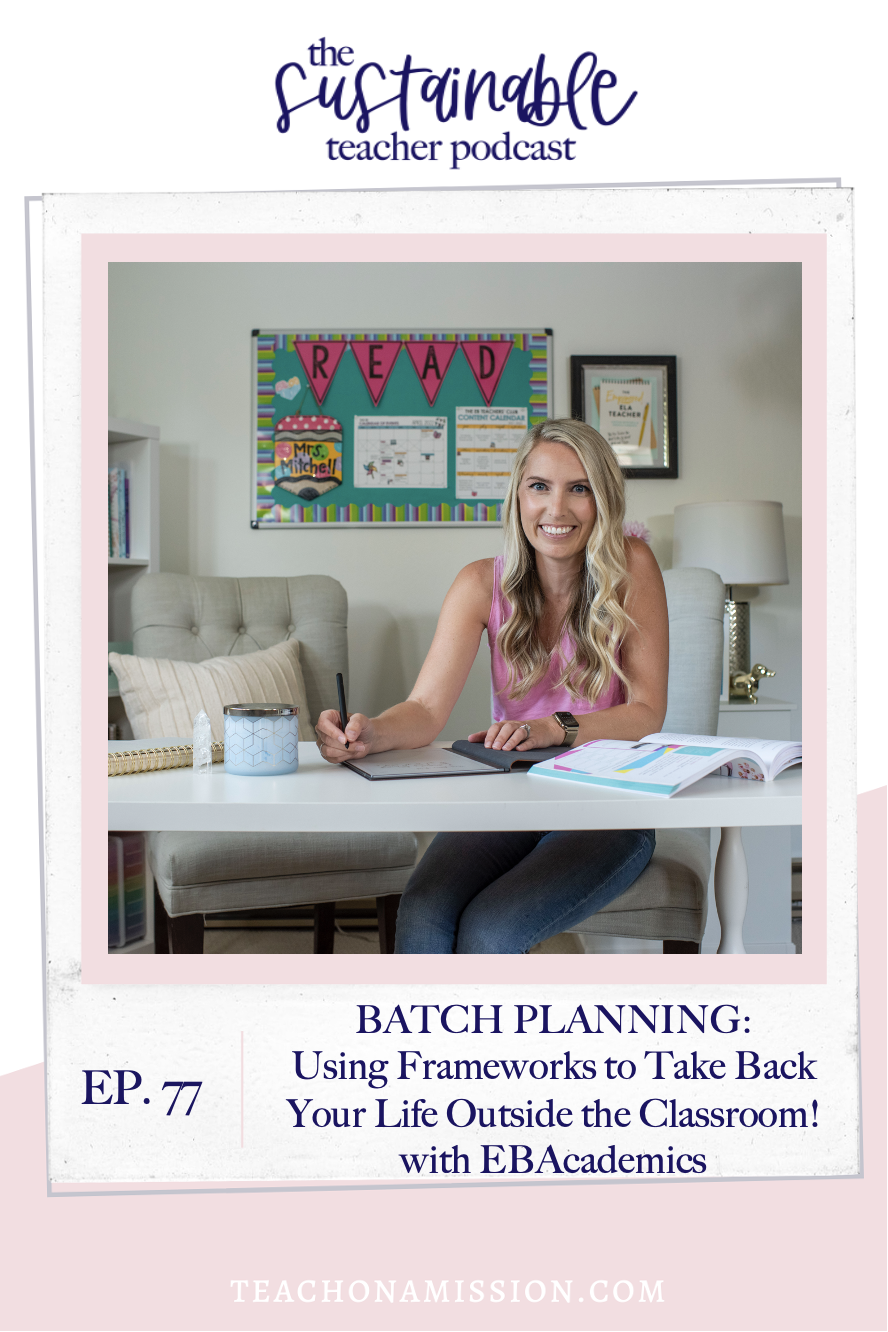
Mandy: Hello teachers. And welcome back to the sustainable teacher podcast. I am so excited to have Caitlin from EB Academics with us today to talk about really what is her number one recommendation in building your dream, sustainable teaching life. And we're just going to get right into it. Hello, Caitlin and welcome.
Caitlin: Hi, Mandy. Thank you so much for having me. I'm so excited to be talking about this topic with your teachers.
Mandy: Yeah. It's going to be great because our topics and our messages to teachers really do complement each other. And I think this is going to be a really valuable 20 to 30 minutes of a teacher's time who's sitting down to listen right now. So I'm super, super excited. So let's get right into it. Just introduce yourself, tell us about all things, Caitlin and EB Academics.
Caitlin: Yes. Well, my name is Caitlin Mitchell. I am the CEO of EB Academics and we serve middle school English teachers. So if you're a middle school English teacher listening to this podcast we assist you and we have two things that we do that through. We have our EB teachers club, which is our monthly membership and then our EB writing program, where we teach teachers how to teach writing, you can say, teach enough in that sentence. And then we also have a podcast, the Teaching Middle School ELA podcast. But what we are gungho about and so passionate about is not only ensuring that teaching is sustainable, but that teaching is enjoyable. And this is something that Mandy and I just talked about on our podcast. I just interviewed Mandy, we're doing a little podcast swap. So our episode aired this week also.
So you can go listen to that one after you listen to this one and it's just so important to ensure that teachers have the systems and processes in place to have the “both/and” in their lives of being able to be the great teacher that you want to be, to do great work in the classroom and thrive outside of school. Like that's one of our mottos is be, do, thrive and it's not just the being and the doing of teaching. It's the thriving as a human being, so that you love teaching. You don't get burned out. You want to come back to school every single day. And that is possible through systems, through frameworks that really set us up for success. And we're going to talk about one of my favorite frameworks today on this episode.
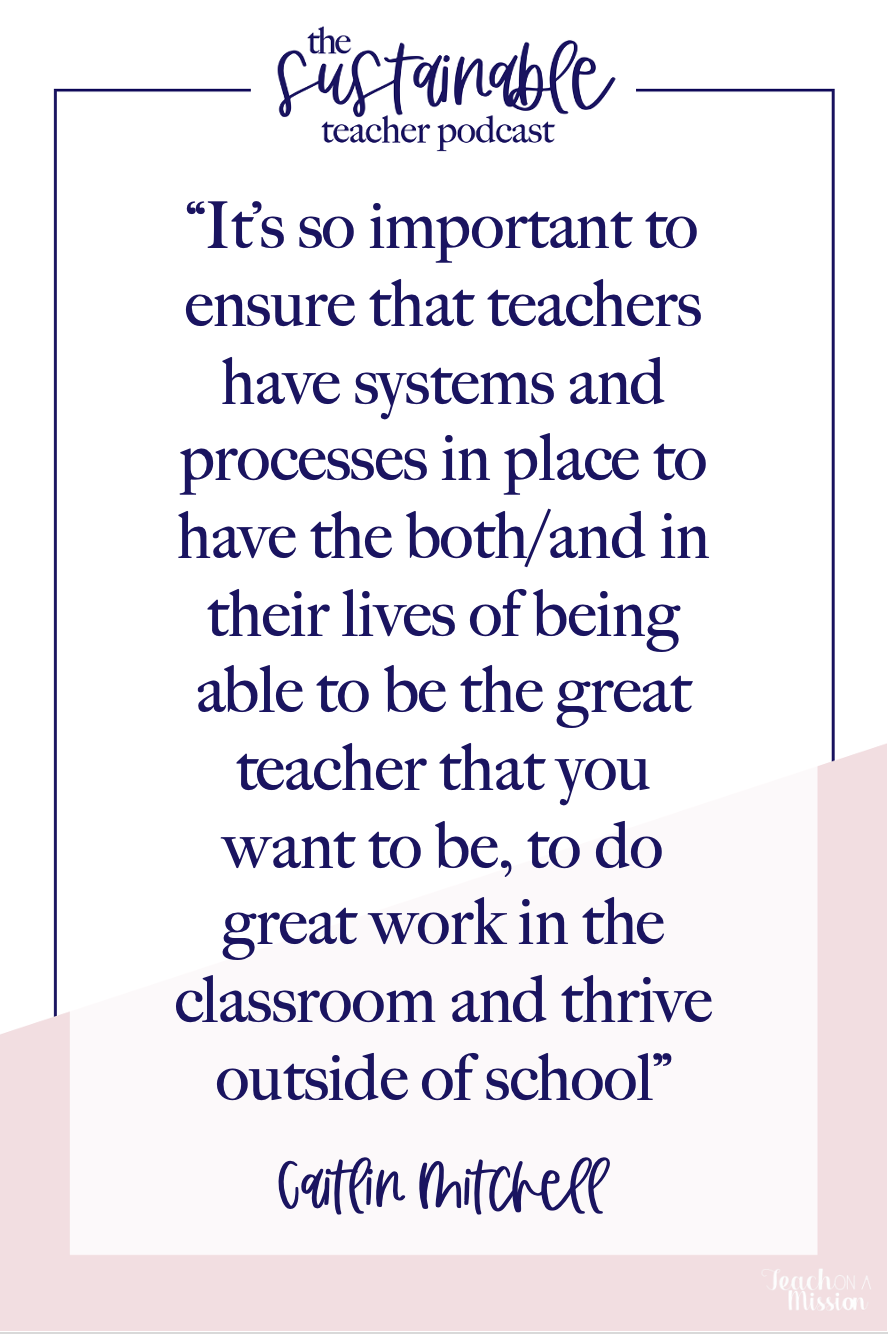
Mandy: There you go. Yeah. That's awesome. Something I was just thinking, as you were saying, that is, yes it's absolutely through the systems and things that you kind of invest a bit of time in upfront that are going to serve you. And I would say help your future self later. But I think it's something that we're underestimating and it's honestly something that I'm pretty excited about as time is going by. And really right now, as times are really hard for teachers, is that more and more folks like you and I, and a lot of other education entrepreneurs are here to support teachers in authentic ways. So as much as systems and all of that, yes, that's absolutely huge, but there's support out there.
There is accessible support, not just what can be sometimes limited support within your school or district, but even just the teacher gram. Like that was so inspiring for me and some of the hardest times of teaching was finding other teachers on Instagram and just being lit up by them really. And it's exciting to kind of see the programs and supports that are being offered that hopefully teachers are encouraged by, that it's there. The support is there. Let's find it and let's get it in front of teachers.
Caitlin: Totally. And I want to riff off of what you just said, totally going off the cuff here. But it's been really interesting, as a business owner I've done a lot of self-development work, leadership work, mindset work and just really setting myself up to be happy in a career as a CEO, which can also carry a lot of anxiety, a lot of stress, a lot of depression. And I'm seeing how beneficial that is for me. And I didn't have that in the classroom. And I think had I had that access to that type of content to help me just live differently and just exist differently as a teacher, would've been really powerful in addition to like what you're saying, having systems. So it's just really interesting to me, like why doesn't that exist in our school districts? Why doesn't that exist in our schools? But you're so right, Mandy, that it is starting to exist for teachers just in different ways, listening to your podcast, the Sustainable Teacher Podcast, like that is why you are here, you know? So I love that.
Mandy: That's so awesome. What I would love for you to share is just kind of your story, your education life, like how did EB academics come to be a thing? And just tell us about your education and your role in that.
Caitlin: Yeah. So I actually started out as a high school English teacher. I was 22, right out of college, totally mistaken for a student for, gosh, I don't know the first five years of my life. And about three and a half years into the profession, I really felt let down by a lot of things and disillusioned with education. And I actually quit three and a half years into teaching. I quit in like March. I didn't even want to make it through until the end of the year. I was just done with the whole thing. And I went into corporate America. I had a "great job" in sales for iHeartRadio. I worked in Beverly Hills, it was like this high paying job. I was like, I'm making so much money. Teaching, you don't get paid anything, whatever. And then I realized how much I had no purpose in life anymore.
And I realized I had to go back to the classroom because my life lacked meaning, my life lacked purpose. And I felt like as a teacher, I was living my life's mission and vision to impact other people in a positive way. But I knew when I went back, I could not keep doing what I had been doing because I would just end up quitting again and being burnt out again. And so when I went back to the classroom, it's interesting, that's when I ended up meeting Jessica, my business partner, she worked across the hall from me and she always left school at 3:15. She closed her door, left school and I'd be so mad that she was leaving at 3:15 and I was staying, I'm like mad at her that she's doing that. Like, how can you be a good teacher? All of these misconceptions of what it means to be a great teacher.
And finally, I cornered her. I asked her, I'm like, what are you doing? Why are you leaving at 3:15? She's like, oh, well I just have this like system in place. A batch plan. I'm like, what is that? I'm like, please tell me what that is. And so she sat down with me and taught me her system and how she batch planned. And I started implementing it and making my own adjustments and things like that. And I started batch planning and I started leaving at 3:15 and I was like, dang, this actually like works. It felt like I got the keys to the kingdom type thing, like the clouds parted and the holy grail of teaching. And so that's kind of where everything transpired from, in terms of our relationship.
And then we started EB academics and we actually both retired from teaching about two years ago to be full time. It wasn't sustainable to do both anymore. And so being full time and EB has allowed us to now bring this concept of batch planning and our teaching pedagogy and our philosophies to thousands of teachers around the world, across the country. And batch planning is at the heart of what we teach our teachers in our communities and in our memberships, because it is such a game changer in your teaching life.
Mandy: With batch planning, would you say that's like your number one? It sounds like it based off your story, that's your number one recommendation for anyone listening that wants to build a more sustainable teaching life.
Caitlin: Yes, I think it's the place to at least get started with, if you're not going to do anything else, at least batch plan for yourself. I mean, we even wrote a whole fricking book about it. Like we so wholeheartedly believe in it. And it's hard. It takes work. It takes a lot of upfront work, kind of what you were talking about with the flipped classroom. It's not just something that is easy, but I think there's power behind setting your future self up for success so that your future self can look back and be like, oh, thank you so much for doing that. I know it was a lot of work at that time, but I am reaping the benefits tenfold months later. So it's very powerful in that regard.
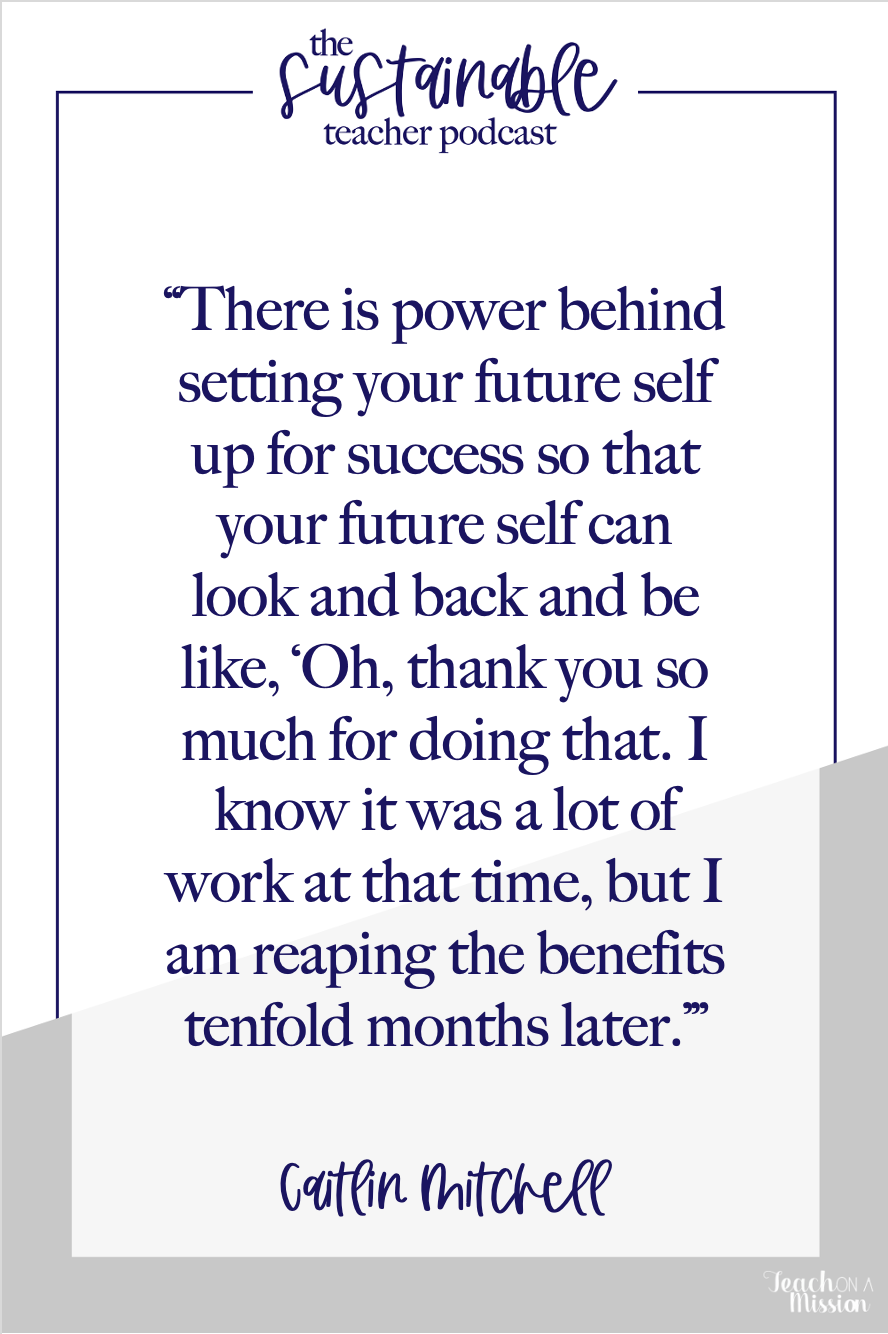
Mandy: That's awesome. Okay. So if you don't mind tell us about it. What is this? I understand what batching is, but I didn't understand it when I was a teacher. And teachers are so used to doing everything all at once. That kind of, what is this idea of batching and what can that look like for a teacher?
Caitlin: Yeah, it's very interesting because when we started the business, that's how we operate. Everything is batched. Podcast episodes are batched. Blog posts are batched, resources are batched. Everything in the company is batched. And I don't know why this isn't taught in schools to teachers in their education programs. Essentially what batch planning is, is you set aside one or two big lesson planning days every so often throughout the school year. So you might do two days in the summer, which we're actually hosting a two-day live batch planning event on the 27th and 28th. If you want to come join us, I'll give you the link for your listeners. And even if your listeners aren't English teachers, they might still benefit. We teach everything through the lens of English, but the concepts are still the same across curriculum.
So you pick one or two, big lesson planning days, and I'm talking like, tell your partner, don't come near me for six hours. Bring your snacks into your room and lock yourself in a separate place. And you are going to batch plan for either the next month, the next two months, the next quarter marking period, whatever. And then you'll do it again once your batch planning kind of runs out and what's beautiful is it's like any other skill that we learn in life, you get better at it over time. So some of our teachers are coming to batch planning life for the fourth time. And they're like, now I can go all year. I can sit down and batch plan my entire school year in these two days in the summer.
And so I think that's just really cool and empowering because the first time you sit down to do it, you might feel like an epic failure. Like when you do anything for the first time. But it takes that resiliency, that determination to set yourself up for success in using these two batch planning days. And we have specific frameworks that we teach that I can talk a little bit about too, of like, okay, well, that's great. I'm going to pick two days to lesson plan. What the heck does that actually mean?
Mandy: Yeah because in my mind I'm thinking if I'm lesson planning, it's going to take way more than two days. There's got to be some framework there.
Caitlin: Totally, but it's not, there's a certain way that you can do it where it's not going to take you hours upon hours of time. And what's great too, is once you have your lesson plan set up, what I would do is on Fridays, I would stay for a half an hour extra. That was the only day of the week that I'd stay late. And some of our teachers just do it on their planning period on like Thursday. And I'd make all of my copies, I'd print out my lesson plan that I already had created months prior, set my desk up for Monday. And I literally would not think about school the entire weekend, to the point that I'd come in on Monday and I'd be like, oh shoot, what am I teaching today again? Because I had it all laid out for myself. So that's really cool.
So in terms of batch planning, we have four different stages that we walk our teachers through. And it's probably going to sound overwhelming because obviously, like we have a whole two-day event about this. We have a million blog posts, a ton of podcast episodes, all dedicated to batch planning. But basically each stage moves you from the macro level overview of lesson planning with your scope and sequence on like a very high level, 30,000 foot view, to stage 4 is like the actual day to day lesson planning. What I'm actually teaching on September 2nd, what I'm actually teaching on January 3rd. I know what that is. And if I do it digitally, I have my resources hyperlinked. So everything is in the system that I've created for myself that I'm just opening it up and teaching that to my students.
And what's cool about it, one of the arguments that we get from this, “well, how can I batch plan if I don't know my students,” which is totally a fair assumption. How could I do that? Absolutely. And what's great about it, is it's flexible. And I actually argue that batch planning allows you to meet your students’ needs even more so because you are not scrambling on a day-to-day basis to meet them. You have a foundation in place that you can now build off of, make changes to, small tweaks here and there to meet your students' needs, to adjust based on the classroom culture that you have and the students that are in your classroom. So I do feel like it does allow actually for a better student education experience than what I used to do, fine by the seat of my pants and staying up until 12:30 at night, reading the texts the night before I was going to teach it in class to my juniors.
Mandy: Yeah. It's like living with your hair on fire. It's absolutely awful. So as you're saying this, it reminds me so much of, I love what you said about it kind of lays the foundation. And it almost can act as a launch pad for the other things that you need or want to get to, like using formative data to respond to the needs of your students. And getting to know them, your relationships, you now have that mental capacity and space because so much has already been taken care of. And that reminds me, and I feel like I've said this exact line about the flip classroom as well. It's just, the batch planning is about the plans are set in place. The flip classroom is about the content is already there. The content is already there. So you have the time and space to do the other things that you want to get to. So these really are complimentary.
Caitlin: Yes, that's exactly right. Yes, 100%. And the thing too, that we hear from teachers before they come to us, or when they're thinking about joining our membership or whatever, is just all of the outside factors of teaching from the system that we have no control over, parents, unsupportive admin, crazy mandates from districts, from state levels, I could name a million different things that I've heard from teachers that make teaching not fun, quite frankly. And if we as teachers can create a system in our own classroom, like batch planning, like using frameworks for our lesson planning approach to insulate at least one part of ourselves from the system, we are able to operate with some greater level of peace and joy with what we can control, as opposed to allowing planning to also be one of those things that the system affects us. So it's like we still get to have the common enemy of all of the things in teaching that we don't like. And it's like batch planning becomes the hero that saves us in some capacity.
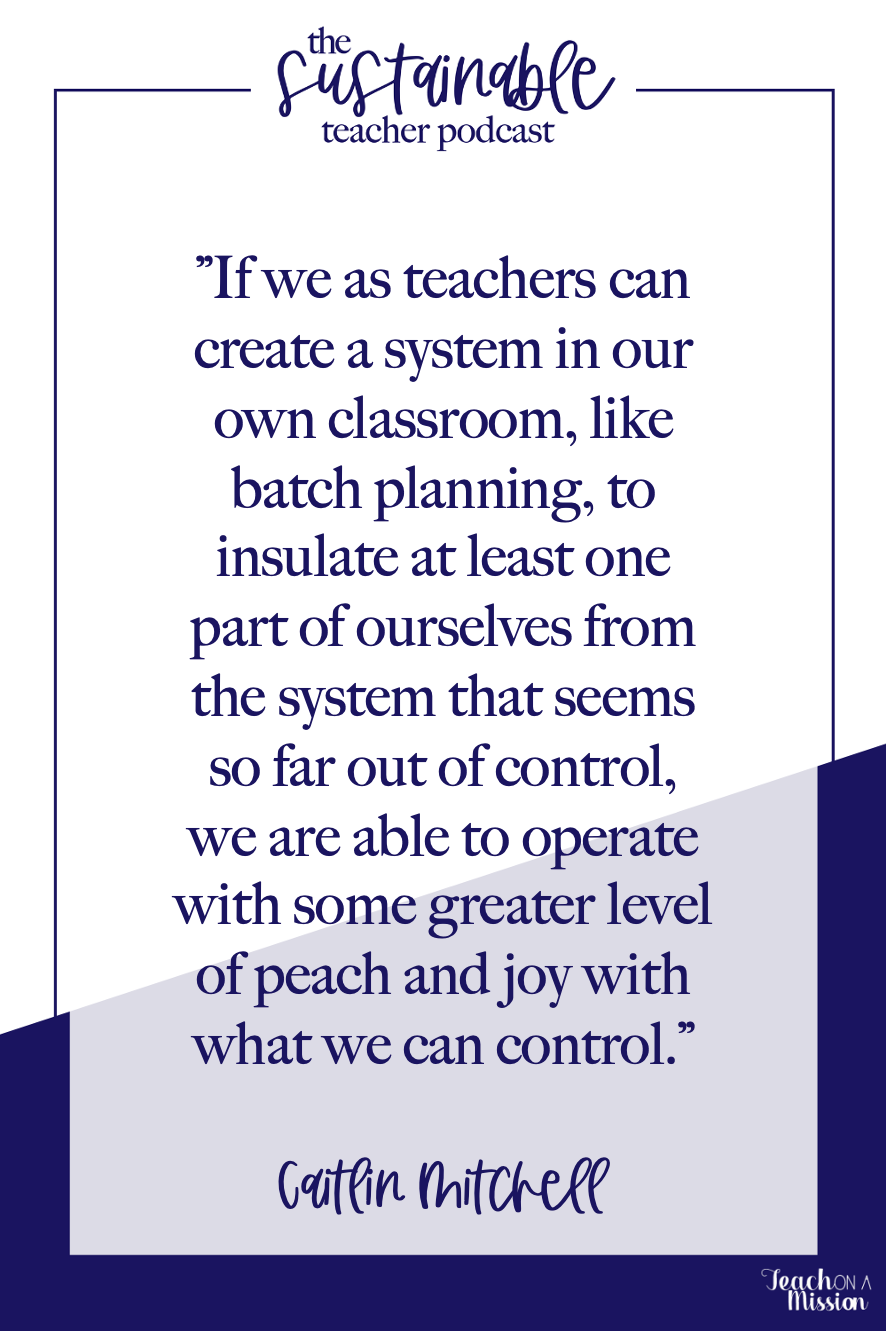
Mandy: I love that you share that because I oftentimes get in my head about, the Sustainable Teacher Podcast and the message of we can do this. Like we can do this, let's focus on what we can control because there are systematic things. There are aspects of a broken system that we're fighting against and we can't. But yes, I love how you say, if we could just insulate this one thing that allows us to kind of be away from that and gives us peace and joy in what we are doing, that could be our saving grace. It could even be enough to allow us to roll with the punches and all the other aspects of teaching.
Caitlin: Yeah. Well, because we have, like you mentioned it, we have this wide space in our brains now to be able to handle all of these other things. I'm not taking grading home anymore. I'm not staying up until 11:30 at night. I have a great relationship with my partner and my kid because I get to be present at home with them because I don't have a stack of 150 essays staring at me that I've like set up a little plan with myself. If I grade five essays, I get to eat a piece of candy and then I'll do the next five. Then I get something else, like this reward system to work through it. I can use my planning time at school to grade now because I've set myself up for success.
So even though it's hard in the beginning to dedicate those two days and to dedicate that time, like I said, it's any skill you get so much better over time. I mean, Jessica and I just planned an entire year for an example for something that we're doing. And we planned a whole year of curriculum, I kid you not in like two hours and it's because it's just become so second nature, so easy and once you do it one year, if you don't have a new grade level the next year, you're not switching anything or adding anything, you have everything set up for yourself and you can make adjustments based on what did and didn't work that year for the next year. So there are just so many positive benefits that come out of batch planning. It is like the number one thing that I would, go to whatever, to the end of the earth to have teachers do.
Mandy: Yep. Shout it from the rooftops, like this is the one thing that I'm going to put on my billboard yes. Oh, that's so awesome. Okay. Well it's just such a huge step towards sustainability and really getting back to finding that peace and joy, just like you shared. And this is so awesome. So if teachers who are listening want to learn more about this batch planning and they want to learn about your event, where can they go?
Caitlin: Yeah. So if you want to join us for our summer batch planning live event, it's a two day live event. So you're actually sitting with us, we're teaching you the different stages. We're answering questions, we're doing hot seats with teachers, breakout rooms. We have guest speakers, the whole nine yards. And what's really cool actually is that 100% of the profits from the event are being donated to a foundation called village impact, which empowers girls through education, which is something near and dear to our hearts as female business owners.
So if you go to EBteacher.com/summer2022 BPL, and that stands for Batch Planning Live, you can grab a ticket to the event and we'd love to see you there. And then of course, if you want to just get started on our blog and you just type in batch planning on EVacademics.com, you'll see a litany of resources come up of just where to get started the next step, so that you could do it on your own if you wanted to.
Mandy: Yeah. Even before the end, you said it was June 27th.
Caitlin: Yes June 27th and 28th
Mandy: Yeah. So even before then you can get to their blog and just kind of do some research on, okay what could this look like, especially if you're not an ELA teacher listening. This applies to all content areas. Absolutely. But you could start the wheels turning in your brain of, okay what could this look like in my content area? My wheels are already turning on what it could look like in social studies. I feel like I did this to a certain extent. I did it by unit. But yeah, I would love to hear more about that framework. So I'm going to have to check that out as well. So we'll be sure to put the link where you're listening and also on our website. So thank you so much, Caitlin. I appreciate it. Where can everybody find you?
Caitlin: You can find us anywhere online, just type in EV academics. We're on Instagram, TikTok, I guess now, too. We have a YouTube channel, Facebook, the whole nine yards and we also have our podcast, the teaching middle school ELA podcast. If you happen to be a middle school English teacher, we'd love to have you over there. So thank you so much for having me love talking to you so fun.
Mandy: Awesome. Yes. Thanks so much. Caitlin, alright, bye everybody. Have a good one.
Alright, teacher-friend there you have it for Ep 77 Batch Planning: Using Frameworks to Take Back Your Life Outside the Classroom! with Caitlin of EBAcademics. Be sure to find Caitlin and her business partner Jessica on social media and on YouTube, as well as on their podcast. And don’t forget to click the link where you’re listening to sign up for the Batch Planning live event that they have coming up at the end of this month, and I hope to join you as well.
Ok, teacher-friend I’ll see you same time same place next week, bye for now.



